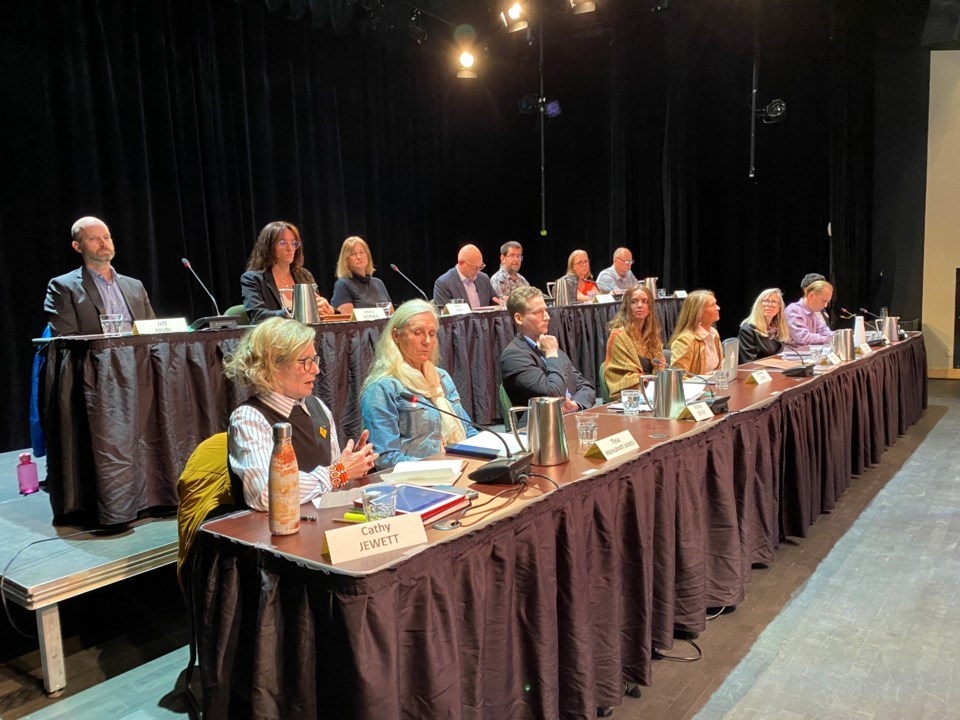A Whistler resident is raising concerns about wording used on voter information cards sent out by the Resort Municipality of Whistler (RMOW), saying the wording is misleading, and amounts to soft voter suppression.
The RMOW sent the information cards to eligible Whistler voters ahead of the Oct. 15 municipal election to encourage more people to vote.
But Whistler resident Michael Burnett points out that a phrase on the card—telling voters they can “bring this card and two pieces of ID with you to make voting faster and easier”—could have had the opposite effect.
In British Columbia, ID is not required to vote in municipal elections if you are registered to vote. However, if a voter is not registered, they can do so in person on election day by showing two pieces of ID.
In Burnett’s view, the RMOW’s chosen wording may have discouraged people who don’t have government-issued identification. Further, if a resident lost their information card, they may have thought they wouldn’t be able to vote.
“I’m working on a campaign [for mayoral candidate Marcus Culver]; I’m thinking, well, this is a bit odd, right? This is misleading, this is badly worded, it’s incomplete, and it’s on a piece of election material that the [RMOW] sent out to thousands of people,” Burnett said.
The info on the cards was “completely incorrect,” he added in a follow-up email. “It gives the wrong information about voting ID requirements in a way that makes it sound much more complicated to prove your right to vote than it really is. This is potentially vote suppressing and it is a very serious mistake to make in an election.”
With that said, Burnett was clear that he did not mean to imply the cards were worded the way they were to intentionally suppress the vote.
“I’m not saying there’s a conspiracy, but it’s definitely soft voter suppression … In any democracy, anything in what is supposed to be a free and fair election that can prevent people from voting or discourage people from voting, that’s voter suppression.”
For its part, the RMOW believes the voting cards did help make things quicker at the polls, and that there was nothing incorrect or illegal about suggesting people bring two pieces of ID to increase efficiency at the polls.
However, a municipal spokesperson did concede that the wording could have been better, adding the RMOW likely won’t include the same prompt next election.
“The voter cards are new to our municipality, and we believe they are an important tool for increasing voter turnout. The cards act as an additional prompt to get out and vote,” RMOW communications manager Jennifer Smith said in an email to Pique on behalf of RMOW elections officer Pauline Lysaght.
The RMOW sent out 9,227 voter registration cards to all registered voters, broken down to 8,489 residents and 738 non-resident property owners.
According to the provincial Ministry of Municipal Affairs, additional identification is only required when voters aren’t registered to vote.
“Voters are only required to provide additional identification if their name is not on the list of registered electors, or when the jurisdiction does not maintain a voters list and uses same-day voter registration,” a spokesperson said in an emailed statement.
Maxwell Cameron, a professor of political science at the University of British Columbia, believes that while the wording could have been better on the voting cards, the intention is likely innocent and not designed to discourage voting.
“I don’t know what the intention was behind it, but it could be perfectly innocent. People sometimes show up without an appropriate ID, and [this could] just save them that problem,” Cameron said.
“It’s probably good to encourage people to have a couple of legitimate pieces of ID, but they don’t need it, and it’s important to emphasize that, because you want to make the barrier to voting as low as possible.”
In 2022, 34.98 per cent of registered voters came out to vote in Whistler, up from 32.46 in 2018, but still far below the 54.8 per cent turnout in the historic 2011 election that saw all incumbents thrown out of office. That election remains the highest turnout in Whistler’s history.




